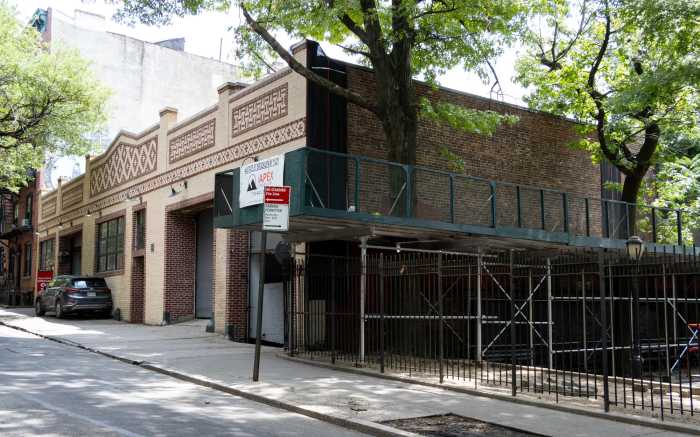Borough President Marty Markowitz subjected himself to questioning at
the Park Slope Food Co-op last Saturday, much of it dealing with developer
Bruce Ratner’s plan to build a basketball arena, apartment buildings
and office towers in Prospect Heights.
Markowitz said he came to the meeting expecting to be confronted by opponents
of the arena plan and to many of the 30 or so people who attended he appeared
confrontational.
“Obviously I’m not stupid. I knew the turnout would be those
who I know are opposed to the arena,” the borough president said
in his opening remarks in the upstairs conference room in the co-op’s
782 Union St. brick warehouse.
Markowitz blustered through explanations that many said were old answers
to new questions.
“I also have a right not to answer questions,” he said. “That’s
my perfect right as a resident and a citizen.”
Along with the disclaimer, Markowitz said he was concerned about the efforts
of some people to “personalize this effort around me.
I’m a big boy, I understand,” he said, adding, “Whenever
I do anything I really believe in, it’s for the good of Brooklyn.”
He also made a point of noting that the contentious Atlantic Yards arena,
housing and commercial-office development plan was still in its early
stages.
“As of yet, the developer has presented a wish list. Given the stars
and the moon and the sun all line up together, the actual footprint will
be determined later,” Markowitz said of the massive development plan,
which would emanate from the intersection of Atlantic and Flatbush avenues.
Then he called upon raised hands.
Tom Gogan, of Prospect Heights, said he had a hard time understanding
the scope of the project, and asked about publicly subsidized tax abatements
offered to Ratner’s company, Forest City Ratner.
“If we don’t know what the public cost is going to be, how is
it responsible for a public official to be such a cheerleader?” Gogan
asked, referring to Markowitz early and continuous support of the plan.
Gogan added that so far there are no commitments or signed agreements
for what Ratner will bring to the community in exchange for having the
state condemn so much property in the neighborhood.
“There will be,” responded Markowitz, who brushed off the first
part of the question by downplaying his role in the negotiations.
When questioned about the U.S. Supreme Court agreeing to hear an eminent
domain case in New London, Conn., which may determine whether or not a
government can seize private property to resell for higher tax-producing
private developments, Markowitz did not pull any punches.
“The Supreme Court’s decision will make or break it,” he
said, referring to the arena plan.
Diane George, who said she lived in Prospect Heights for 12 years before
rising rents forced her to move to Sunset Park, asked about the availability
of middle- and low-income housing in the Atlantic Yards plan, and Markowitz
responded with gusto that Ratner’s offer to set aside 50 percent
of the 4,500 units of housing as “affordable” was a major reason
for his support of the plan.
The borough president said he would not support the plan if it did not
include the promise of affordable housing. But when George asked him if
he would withdraw his support if that commitment was not honored, Markowitz
said carefully, “I would be one very unhappy person.”
When Markowitz called on George again, she asked why the development was
a state-level process, and how it could “skirt” city review.
“It was understood by everyone on my staff, and folks who specialized
in city planning say it’s a state process,” he told her.
A question from the back of the room asked if Markowitz would hence favor
a change in public policy.
The borough president contended that he has met with advisors about seeking
change in the state legislature, and named state Sen. Carl Andrews, who
replaced him in the Legislature, as a person he had consulted.
“I will answer as soon as I feel confident that I can share it,”
Markowitz said, refusing to say more than that.
After the meeting, the co-op members chatted in small circles.
“He’s using the same responses he used over a year ago,”
said George, who said the borough president’s response to her question
on state-level authority was circuitous. But what bugged her most, she
said, was his demeanor.
“As a public official you don’t come into a meeting with a defensive
attitude,” said George.
“He raises his voice. He was very attacking. He tells people not
to make it personal, but he’s clearly emotional about it and takes
it personally himself. That makes it personal for other people.”
Susan Metz, a teacher running as a write-in candidate for Assembly against
deposed Democrat Roger Green, said she was worried about what Markowitz’s
definitions of affordable housing were.
“Affordable is a meaningless term,” said Metz.
“They said themselves that affordable is $60,000 [income] a year
— that’s like $1,800 a month,” which she said most people
could not afford.
Gloria Brandman, a Prospect Heights resident and co-op volunteer said
she was disappointed that Markowitz seemed to ignore genuine concerns
from the community.
“He appears to be blindly supporting [the arena plan] and a rational
person would have to wonder what it is he stands to gain,” Brandman
said. “He wants to paint a picture that he supports everyone in office.”
Gogan said he felt unsatisfied with the responses from the borough president.
“I wanted to ask him, ‘Why don’t you give us a date when
you’ll have the answers, and then we’ll talk?’”























